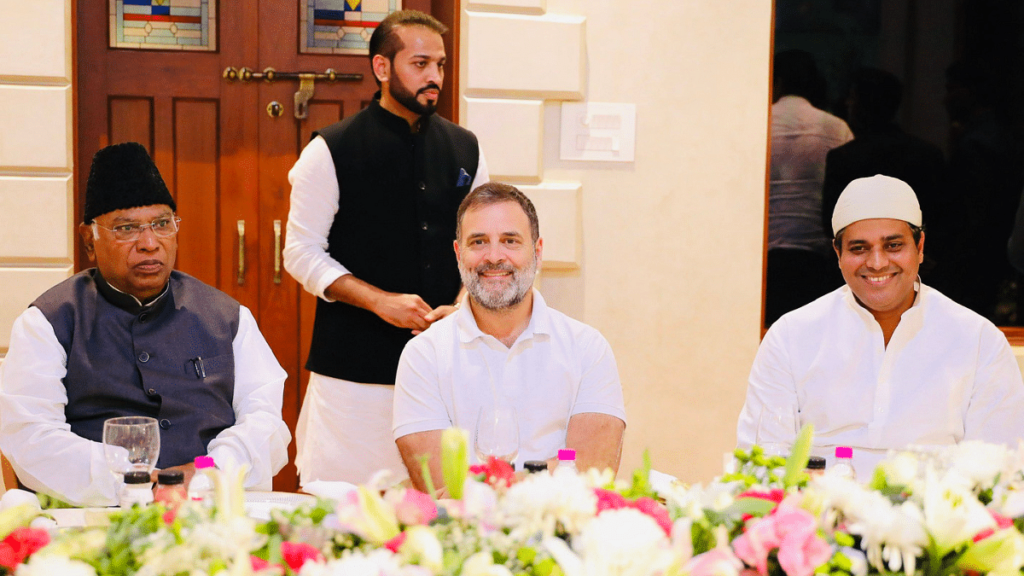New Delhi: Lok Sabha Leader of Opposition Rahul Gandhi attended Congress Rajya Sabha MP Imran Pratapgarhi’s Iftar party in New Delhi last week, seven years after hosting a similar gathering, only to later discontinue the practice.
It is a sign of the times that Rahul’s presence at the event, which was attended by leaders from every Opposition party, was seen as politically significant in a city where such gatherings were once a fixture of the annual calendar.
Then came 2014, the year when Narendra Modi took charge as the prime minister of a government led by the Bharatiya Janata Party (BJP), which, for the first time, did not require the support of allies to capture power at the Centre.
Iftars became a relic of the past, with the Modi-led BJP labelling them as political theatrics aimed at appeasing Muslims. The Congress tried to hold on to the practice—with Sonia Gandhi hosting two in 2014, 2015 respectively and Rahul in 2018— but could not sustain it due to the absence of a favourable political climate.
In fact, since hosting his last Iftar in 2018 as Congress president, Rahul had not attended any Iftar parties hosted by others in the last seven years, during which the party suffered two more defeats in the Lok Sabha elections.
This makes his appearance, alongside Congress President Mallikarjun Kharge, at Pratapgarhi’s Iftar party especially notable. It turned heads, particularly since neither of them had visited the Maha Kumbh at Prayagraj, drawing criticism from the BJP for insulting “Hindu faith.”
Kharge had, in fact, sparked a controversy by asking if taking a dip at Kumbh would help eradicate poverty.
Pratapgarhi dismissed the BJP’s criticism, pointing out that even Rashtriya Swayamsevak Sangh (RSS) chief Mohan Bhagwat did not attend the Kumbh. “Many Congress leaders, including Karnataka Deputy CM DK Shivakumar and former Madhya Pradesh CM Digvijay Singh, took dips at the Kumbh. Rahul Gandhi has been to Badrinath and Vaishno Devi. Was he ever branded a Hindu Hriday Samrat then? Then why should he be labelled for attending my Iftar?” Pratapgarhi said.
Until 2014, Iftar parties, which first gained currency in Delhi under Indira Gandhi as the prime minister, served as a barometer of the shifting sands of Indian politics, as new equations gave way to the old in the national capital as well as state capitals.
Smt Indira Gandhi at Iftar in Hyderabad House, 1981 pic.twitter.com/FNwteKV28h
— Congress (@INCIndia) July 7, 2016
Take, for instance, the year 2001. The presence of Ram Vilas Paswan and Sharad Yadav, who were then serving as ministers in the Atal Bihari Vajpayee-led National Democratic Alliance (NDA) government, at the Iftar gathering on the lawns of the Congress headquarters became a talking point for days.
As Prime Ministers, Vajpayee, as well as his successor Manmohan Singh, hosted Iftars annually. Modi did not just discontinue the practice but also refrained from attending Iftar parties hosted by Pranab Mukherjee as the President till 2017.
Shivraj Singh Chouhan, as the Chief Minister of Madhya Pradesh, was among the few prominent BJP leaders who continued to host Iftars, despite a clear signal from the top echelons of the party that such practices were no longer necessary.
But it is not just in the BJP camp that the annual feasts disappeared since 2014. Even the Congress, as the principal opposition party, has become increasingly cautious about the political fallout from hosting Iftar events in recent years.
The first Iftar that Sonia Gandhi hosted after the Congress lost power at the Centre in 2014 reflected the party’s diminished stature as the only two top political faces – Lalu Prasad of the Rashtriya Janata Dal (RJD) and the late Sharad Yadav, then with the Janata Dal (United), or JD(U) – in attendance. A year later though, leaders of nearly nine opposition parties graced the Iftar hosted by the former United Progressive Alliance (UPA) chairperson.
Then came the breaks, which gradually became the norm. In 2016 and 2017, the Congress did not throw Iftar feasts. In 2018, Rahul, having taken over as the president of the Congress, held an Iftar at a private hotel in Delhi. Former Presidents Pranab Mukherjee and Pratibha Patil turned up at the event, which highlighted the Congress’s political isolation with very few allies in attendance.
Good food, friendly faces and great conversation make for a memorable Iftar! We were honoured to have two former Presidents, Pranab Da & Smt Pratibha Patil ji join us, along with leaders from different political parties, the media, diplomats and many old & new friends. pic.twitter.com/TM0AfORXQa
— Rahul Gandhi (@RahulGandhi) June 13, 2018
In the subsequent years, the Congress discontinued the practice altogether. This time though, apart from Rahul’s presence at Pratapgarhi’s gathering, Sonia too attended an Iftar hosted by the Indian Union Muslim League (IUML) in the national capital on 21 March, signalling a shift in the party’s approach on the issue of Muslims. Similarly, Wayanad MP Priyanka Gandhi took part in an iftar party hosted by IUML supremo Sadique Ali Shihab Thangal in Malappuram, Kerala on 29 March.
A few instances capture how the Congress has shed its reluctance – ostensibly to avoid being labeled as appeasers – in addressing minority concerns. These include Rahul and Priyanka Gandhi Vadra’s attempt to visit communal violence-hit Sambhal in Uttar Pradesh last December; Vadra’s vocal advocacy for the Palestinian cause and sharp criticisms of Israel; and the party’s staunch defence of the Siddaramaiah-led Karnataka government’s decision to allocate a four percent backward class quota in public contracts for Muslims.
Much like Vadra, who did not tone down her criticism of Israel or her support for Palestinian resistance despite BJP taunts, the Congress’s Karnataka unit has also defended its government’s quota move as constitutionally sound, dismissing opposition campaigns as baseless.
(Edited by Tony Rai)
Also Read: Oxford visit marred by heckling, here’s how Mamata reacted to questions on RG Kar, Singur


